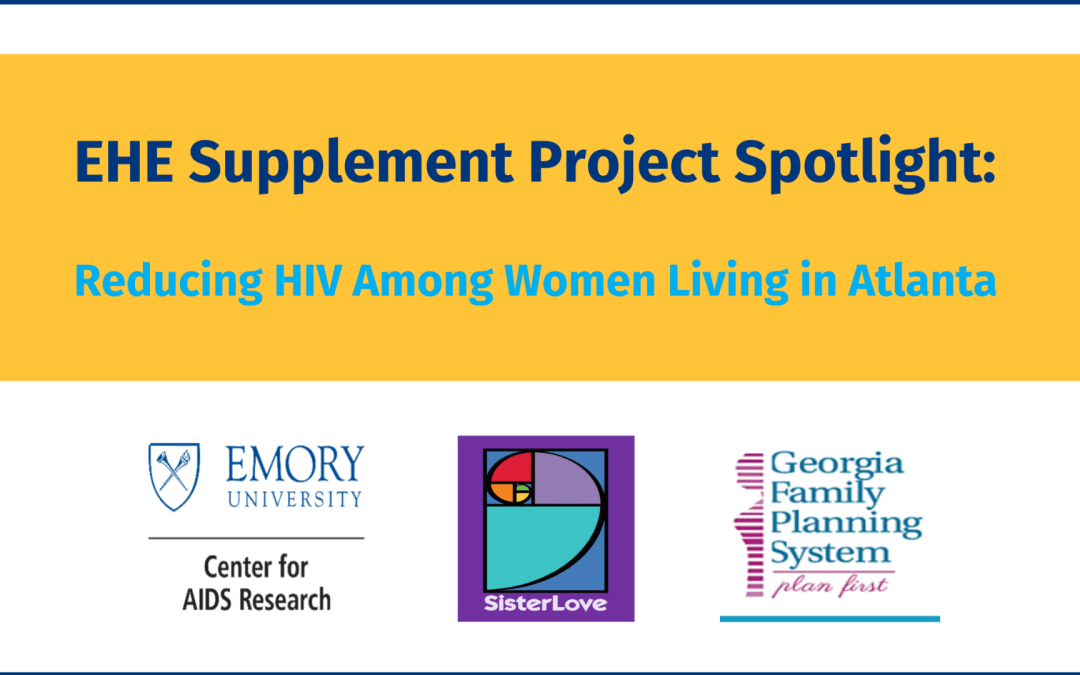The Reducing HIV Among Women Living in Atlanta project was part of the one-year planning grants that received funding in the first round of Ending the HIV Epidemic (EHE) supplements. This project’s focus was on expanding access to PrEP for women within the Title X family planning network across Atlanta’s four metro counties.
“We used our first year to do a lot of formative data collection within the 31 Title X family planning clinics across Atlanta’s four metro counties to really understand where they were at with PrEP and HIV testing within their clinical settings,” said Jessica Sales, Primary Investigator for the project and Co-Director of the Emory Center For AIDS Research (CFAR).
The team met with 28 of the 31 clinics during their funding year and held active listening sessions to learn more about the needs of these clinics in order to offer PrEP to family clients. Working with the state Title X grantee, Georgia Family Planning System, the team identified and compiled sets of resources and tools that could be implemented with the clinics to help them offer PrEP to women during family planning visits.
“The data collected during our listening sessions was used to make a series of trainings as well as resources in the form of patient-facing materials around PrEP and PrEP use for women and provider-facing tools meant to help providers remember elements of PrEP care,” said Sales. “All of the tools and resources created were meant to help prompt conversations with family planning patients.”
One of the bigger challenges that comes with trying to reach women regarding HIV prevention is the low knowledge among women about PrEP. This is a challenge that is faced among several settings in the United States and the project wanted not only to work on improving access to PrEP, but they also to include community centered ways to expand knowledge and reduce stigma around PrEP for women. In order to accomplish this, the team partnered with multiple community-based organizations (CBOs) to coordinate an education campaign that would be delivered in communities throughout the Atlanta metropolitan area.
“In conjunction with SisterLove, we spent time meeting with other community-based organizations to gage their interest and see how they would feel comfortable collaborating and partnering with us in an effort like this,” said Sales. “If HIV prevention wasn’t a primary focus of their agency, we really wanted to know what they would find rewarding and know something that we could provide so that they could get something meaningful to them out of the partnership.”
SisterLove, the project’s lead CBO partner, is an Atlanta-based women’s HIV and reproductive justice CBO that is internationally recognized for raising sexual health and HIV awareness among women and has deep connections in the community. SisterLove conducted outreach to other CBOs located across Atlanta and identified four organizations: Planned Parenthood Southeast; Healthy Mothers, Healthy Babies; Connecting Communities and Family; and Positive Impact Health. All of these are women-facing service agencies that have broad and wide-ranging interest in supporting increasing women’s knowledge and access to PrEP. Over the project year, the team accomplished buy-in and partnerships with these organizations to prepare for a larger project which includes rollout of tailored PrEP trainings and resources to the 31 clinics throughout metro Atlanta and then launch a community organizing grassroots PrEP awareness campaign in the area (An Interactive Systems Approach to Ending the HIV Epidemic Among Women in Atlanta: R01MH12804).
The project was highly focused on moving quickly with the one-year findings to secure funding to continue the momentum that they created. Though there were informal findings presented at various community meetings and conferences, the primary goals were meaningful activities to move the project in the direction of implementation. Sales mentions that there is manuscript for the project that is currently under review and will be shared with audiences once it is published.
More on Project Spotlights: The Ending the HIV Epidemic in the United States (EHE) Supplement Project Spotlight series dives into the research and outcomes of projects funded by the NIH as part of the EHE initiative. EHE was announced in 2019 with the goal of reducing new HIV infections in the United States 90 percent by 2030, and advancing access to healthcare through scaling up HIV prevention and treatment strategies. Visit HIV.gov to learn more about the EHE initiative, and check out the NIH website for information on supplement projects.
Check out other project spotlights:




